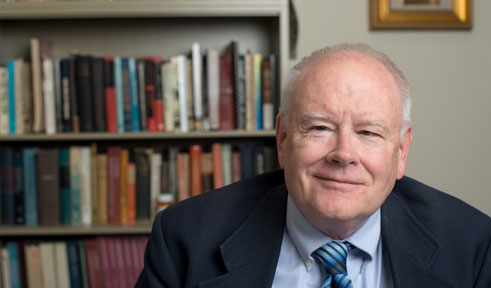
Survival of the Fittest: Consumer Satisfaction Focus Will Help Career Colleges Survive
Interview with Dr. Richard Vedder, Distinguished Professor of Economics Emeritus, Ohio University
Jim Hutton: How did you become interested in career colleges, and how do you think this sector is going to survive?
Dr. Richard Vedder: Proprietary education goes back to the 19th century. But I became interested in the sector early in the 2000s when it was rapidly growing. In 2004, I wrote about it in my book, “Going Broke by Degree,” and I did a few studies on it. I became more involved doing consulting for a few proprietary colleges that were growing, and I even had a small financial interest in one of them.
In 2009, I testified before Congress with Robert Shireman, then deputy undersecretary of the Department of Education. It seemed to me that Shireman was hostile to the sector.
I said then that this sector was in for a lot of trouble and that’s when a lot of rules and regulations were put in place, some which were partially justified in the name of consumer protection. Decent companies offering legitimate educational services were forced out of business by government regulation and attacks led by ideologues with little respect for the free enterprise system on which this nation was founded. Most seemed to be just an attempt to attack this portion of the broader higher education sector, and I questioned whether it was justified.
I talked to and consulted with executives of for-profit private higher education companies and thought, by and large, that they were doing a good job. They serve a different clientele, and some are in certificate programs that are not related to degrees. But they fill a niche that is largely neglected by the traditional higher education sector. They’re going for people who want to have specific skills. In general, I really thought these schools were making a useful contribution.
That’s what got me interested, and my interest has continued because of several concerns. I felt that we had an unlevel playing field due to severe attacks on the sector by the federal government in various ways such as gainful employment rules, state certification type requirements, etc. Simply put, some people were being treated differently than others.
I’d like to see the industry revived. I think there’s a better than decent chance that that will happen. There’s a lot of inherent advantages to the industry. It has a model that promotes efficiency and consumer satisfaction. The minimization of costs and the maximization of consumer satisfaction are the key to business success. Career colleges are extremely cost conscious. They don’t spend millions on non-core activities like intercollegiate athletics or on expensive sustainability efforts. They’re not against or opposed to these issues, it’s just not part of their mission. They don’t construct fancy buildings that are vastly underutilized with elaborate architectural accoutrements that do nothing for learning but add to capital costs. They have classes on Fridays, Saturdays, on the weekends, at night, and during the summer. If you don’t serve your customer well, the customer leaves. Their mission is educating students, and I think overall, they do a very good job of that. In the long run, I think career colleges will survive.
Jim: What would be your top suggestions to CEOs and owners of career colleges as to how to help their schools survive?
Dr. Vedder: Far be it for me to tell CEOs how to run their business. But obviously, the regulatory environment does need to improve and it is improving under President Trump and Secretary of Education Betsy DeVos, who seem to at least be neutral toward the sector. I think that relationship needs to be nurtured. That means reaching out more to Democrats who in a couple of years may be running the Executive Branch again.
Career colleges need to try to make this more of a bipartisan thing or a less partisan thing. The for-profit sector is not out to destroy or hurt people. It does do good things, but a little more outreach is desirable.
I suspect markets are shrinking and that traditional and nonprofit colleges are going to try to reach out more and offer more vocationally oriented programs because they need more students. So I think the sector needs to be cognizant of that and be prepared, and perhaps step up their marketing efforts to counter that. Of course, weeding out bad apples is always a good thing in any sector. It hurts not just the bad apples that are exposed, but it also hurts the whole industry and it leads people to say these are inferior schools or deceptive schools. So I also think that industry self-policing is important.
Jim: Self-policing and peer review is what accreditation is supposed to be about. Previously, you said we need to reinvent accreditation. What should we do to ensure that peer reviews do help weed out those bad apples?
Dr. Vedder: Again, I’m an academic and I can make broad proclamations about what ought to be done, but I’m not very good at the details because I don’t have to implement them. It is true that there’s been a battle over accreditation as it relates to this sector. I think the industry needs to get behind having a solid, reasonably well-regarded accreditor that people accept. If Virginia Congressman Bobby Scott is going to be the new head of the House Education Committee and he’s a liberal Democrat, maybe we need to invite him and his staff to meetings with the accrediting agencies and with the for-profit leaders. Maybe we should ask him to speak at a CEO Summit or some other event of that nature, along with the traditional supporters on the Republican side, such as U.S. Rep. Virginia Foxx, of North Carolina, and U.S. Sen. Lamar Alexander, of Tennessee.
Jim: Do you think accreditation should remain a peer-reviewed, quasi-government process, or should it switch over to a total government function?
Dr. Vedder: I think we need to completely change our approach, eliminating accreditation agencies as currently conceived. Of course, we need to not subsidize and perhaps even allow diploma mills to exist. But the current system of accreditation is overly complex and expensive, emphasizes inputs more than outcomes, is riddled with conflict of interests involving the universities who indirectly control the major regional accreditors, and above all, it stifles innovation and creates barriers to entry.
I have usually been skeptical of government efforts to engage in quality control. In general, I think the accreditation process is broken. It’s expensive and it’s sort of a one-size-fits-all process. There’s very little information of use that’s conveyed to consumers during the accreditation process. The government has its role as being the accreditor of the accreditors, but I don’t know that the government has fulfilled that role well. I think the whole sector is rife for reform. But what exact form that that should take, I’m not sure.
There are days where I say we ought to just do away with accreditation and let Consumer Reports magazine, U.S. News and World Report, Forbes magazine and others who rank colleges and universities take on that function.
Expand the College Scoreboard, which the Department of Education does now. That might be one area where the federal government can do some good. They do collect a lot of data. Let that data be more easily and readily disseminated among the general public. Then let’s step back and let the markets work.
Jim: It seems that everybody thinks their sector is getting the worst deal. Today, politicians seem polarized and far apart. Do you agree?
Dr. Vedder: I suppose I’m naïve. I used to work for Congress, and I’ve spent a lot of time around Congress, so I know a little bit how the institution works. I think it would be wonderful if politicians like Sen. Alexander reached out to Congressman Scott. They’re opposite parties in opposite Houses. I wish they would say, “Let’s have a giant retreat, a weekend where we do nothing but sit around and talk about these issues.” Maybe they could invite career colleges and people like Steve Gunderson, president and CEO of the Career Education Colleges and Universities and a former Republican congressman from Wisconsin, to make 45-minute presentations about issues impacting the sector. They ought to just get together and talk and maybe some of this hostility would dissipate if they found there’s some common ground.
The career college industry is disproportionately serving a market of first-generation students, many who are minorities, academically challenged and who come from poor academic backgrounds. I think the for-profit industry can make a decent case that we’re serving the audience that we want to see greater represented; I think there is some commonality there. Likewise, it can be demonstrated that some of the operators in this industry are far from being sleazy operators. They have served society well and their graduates have done well. The key is to get the two sides together. I don’t know how you do that. But we need to find more of the bipartisanship that was present in the era of the late President George H.W. Bush.
There are also some ways we can tinker with the rules of the political game that might reduce some of the excessive partisanship. Let me give one example. Gerrymandering has become more effective in this era of computerized design of congressional districts, meaning most districts have high levels of incumbency protection and favor the nomination and ultimate election to office of die-hard partisans. The House of Representatives, for the most part, is like the British House of Lords, subject to little change most of the time. If congressional districts were determined on objective nonpartisan criteria with respect to compactness, historical political boundaries and the like, most House seats would be more contestable, and successful candidates likely would have to adopt relatively moderate positions that allow for compromise. A far less partisan House could then negotiate with the Senate where district boundaries are constitutionally determined. I think the policy environment in which you operate would oscillate less violently, allowing for more efficient and intelligent long-term planning.
Jim: You hear about declining enrollment. What do you see as the future for the 20 million students that the career college sector has to work within?
Dr. Vedder: Things don’t look extremely robust for the sector in the next 5-10 years. The declining enrollments that have been exhibited over the last two years — not just in the proprietary sector, but generally in higher education — are likely to continue for a few more years, or at most they will stabilize. The demographics of stagnant or even falling births over the next decade or so adversely impacts the market for traditional-age college students, which could be partly offset by population growth induced by greatly expanded immigration, something that at the moment seems unlikely, at least in the short run. Adult learning could potentially expand a good deal, but to do so would likely require the stimulus from major growth in federal student financial assistance, which is plausible, but not terribly likely unless there is a pronounced change in the political complexion of the country. While we may go into a recession with a lot of unemployed workers saying let’s go back to school, the earnings differential associated with a diploma has stagnated. In fact, there are some indicators that it’s actually declined a bit. The cost of college has continued to rise. So the value proposition is being perceived by the American public to be less good than it was a decade or two ago, while the risks associated with going to college are assumed to be a little bit greater than they were during that same period. This is a challenge for all of higher education.
I think for-profit colleges have a niche that might be exploited to their advantage because they’re providing jobs that have been sort of unfashionable, jobs like working in home healthcare or working as a truck driver, plumber or welder.
I think that as the advantages of these jobs, as well as the high incomes and satisfaction associated with these positions, becomes more apparent, people will change their attitudes a bit. I think community colleges will catch on since they already offer some vocational courses. But I have no way of knowing how the traditional four-year schools will respond. They tend to be very slow on the trigger. They’re not as nimble and innovative as some of the other institutions.
Jim: Look into your crystal ball. What is education going to look like in 20 years?
Dr. Vedder: I’m an economist and our crystal balls are not very good. Our record of forecasting isn’t the greatest. But I think in the long run, people want more education. As our nation gets wealthier, people want to learn skills, but they also want it because they consume education. They enjoy parts of education. There are things that people learn they actually enjoy, and more to the point, they also enjoy the socialization that goes along with getting an education. That’s one thing that the career colleges have played down. They’ve been no-nonsense about earning a degree. One thing the traditional colleges have done is provided you with entertainment while you go to school. They’re provided you with football and with lazy rivers, climbing walls, social clubs and so forth. As our nation continues to get wealthier – if it continues to get wealthier and I suspect it will, but maybe at a slower rate than in the past – people will want to invest some of their new and additional money in education. That’s always been the case and I don’t see that changing. That may mean more people will go on and get advanced degrees. We may have new technology that changes the truck driving field, but we may have some of those people going on to get master’s or other advanced degrees just for the heck of it. In the long run, I think the sector is going to be in pretty good shape.
But there is one major cloud on the horizon. Trillion-dollar federal budget deficits at a time of solid economic growth and very low unemployment are unprecedented in our nation’s peacetime history. In my judgment they are inconsistent with long-term fiscal stability in our country. The short-term political benefits of financing additional government spending through borrowing exceed the political costs, so politicians engage in more spending. Very shortly, it is going to become difficult to finance our debt. Despite current positive economic conditions, the rate of economic growth has slowed significantly in this century, reducing our capacity to grow our way out of much of our sizable fiscal burden. Part of the dilemma is that if the government tries to ease its fiscal burden by new taxes, it potentially jeopardizes the rate of economic growth, meaning it is very difficult to end the problem of national fiscal irresponsibility without imposing a great deal of pain on at least some segments of the American population, including career colleges.
The proprietary education industry is utterly dependent on the federal government. As the reality of the federal fiscal burden hits home in coming years as a consequence of rising interest rates, falling rates of economic growth or other means, it will be difficult to sustain current federal student financial aid programs, much less expand them. If the Democrats take complete control of the government in the next national election, they may be able to delay the pinch, but they cannot prevent it from ultimately imposing severe constraints on the welfare state from which your customers largely finance their involvement.
But there is good news, too. Many career colleges serve customers who are underserved and where demand for newly trained workers likely will grow in coming years. The growing distrust and lack of support for traditional higher education does not apply much to you, and, indeed, I think your reputation may improve because of growing tiredness with the antics of many in mainstream higher education. Americans are amazingly innovative and adaptable, and I suspect you will adjust to the winds of change, and keep creative destruction from stopping your pursuit of success and service.
Jim: Your new book, “Restoring the Promise: Higher Education in America” sounds interesting. Tell us about it, including when it will be out.
Dr. Vedder: It will be out about April 1. There are three or four things that are fundamentally wrong with higher education. First, it’s too costly in the eyes of students. Two, there is too little real learning going on in a lot of schools. They’re not teaching skills. Three, that leads to another problem; that there are a lot of underemployed graduates, particularly of traditional four-year schools.
There is also a problem that is very much a part of traditional higher education, but is not a problem that I’ve seen in the career college sector. That problem is one of a lack of intellectual diversity, a very strong, left-of-center progressive orientation. It seems to me that students should be presented with all kinds of points of view and learn different perspectives on life in a fairly even-handed way. We should be bastions of free speech and so forth. We don’t see much of that. We’ve seen a decline in that in the traditional sector. All of these things need to be addressed.
The bashing of the for-profit sector is another problem that I mention in this new book. It’s uneven and maybe unfair and heavy-handed regulatory behavior on the part of the federal government.
On the whole, I think the federal government has gone too far in trying to centralize control of higher education. I thought we as a nation had done very well by having 50 different states in higher education doing it in 50 slightly different ways. It resulted in a lot of competition and a lot of variety and innovation. It’s the same in having proprietary institutions slug it out with nonprofit institutions, some of them public and some of them private. One of the strengths of American education is its diversity, and I hope we can restore that.
This interview has been edited for length and clarity.
DR. RICHARD VEDDER graduated with a bachelor’s degree in economics from Northwestern University in 1962, and in 1965, he earned his Ph.D. in economics from the University of Illinois. He has been a professor for more than 50 years and is currently in his 54th year of teaching at Ohio University.
Around 2000, Vedder started writing articles for the Wall Street Journal and other media about the higher-education sector. Those articles merged into talks to large groups and a book titled, “Going Broke by Degree,” which was published in 2004.
In 2005, Vedder was appointed by then-Secretary of Education Margaret Spellings to be a member of the Commission on the Future of Higher Education, also known as the Spellings Commission, which was given the task of recommending a national strategy for reforming post-secondary education.
Vedder also ran a research center for many years, and just finishing another book on higher education titled “Restoring the Promise: Higher Education in America.”
Contact Information: Dr. Richard Vedder // Distinguished Professor of Economics // Ohio University
Bentley Annex 316 // Athens, OH 45701 // 740-593-2037 // vedder@ohio.edu











